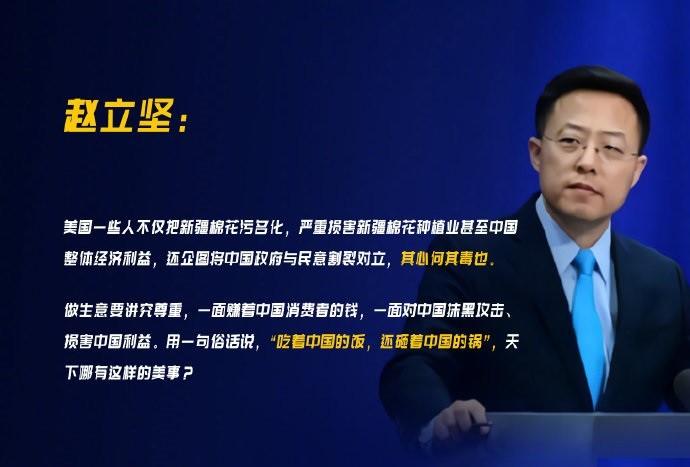At the Foreign Ministry's regular press conference on March 29, spokesman Zhao Lijian said: "Just as my colleague (Hua Chunying) showed you before, the United States and the West have earth-shattering conspiracies on Xinjiang-related issues."

Zhao Lijian stressed that smearing Xinjiang cotton is only part of the conspiracy, and their fundamental purpose is to disrupt Xinjiang and thus curb China's development.
A huge conspiracy – to contain China
Recently, the spokesperson of the Ministry of Foreign Affairs showed a video to the reporters present at a regular press conference. In this video, former U.S. Army Colonel Lawrence Wilkerson directly explains three real reasons for the delay in withdrawing U.S. troops from Afghanistan, two of which are aimed at curbing China's development.
Wilkerson said unashamedly that the CIA stationed troops in Afghanistan was aimed at creating chaos in China and directly bringing down China from within. At the end of the video, Hua Chunying spoke strongly: This drama directed and performed by the Us side is time to end!
Zhao Lijian said that China's market is always open to foreign enterprises, and China has been creating a good investment environment for China, but it is also hoped that the relevant enterprises operating in China will not become tools of certain political forces, let alone challenge China's public opinion.
Behind the smear of Chinese cotton are great economic benefits
The initiator of this round of porcelain Xinjiang cotton is BCI, which is also an organization that claims to be a non-profit organization (NGO). The agency is recognized by European and American governments for setting a uniform standard for cotton around the world; so the question arises, is this institution really non-profit? How to ensure the fairness of its rating?
Is BCI profitable? It's not profitable; so where do its O&M costs come from? Given by the United States. In 2016, the BCI received sponsorship from the U.S. Agency for International Development, the U.S. "financier," which was accused of being a "spy organization" that specializes in infiltration. Their goal is to manipulate the political process in certain countries by infiltrating nonprofits like the BCI.
China has become the world's largest cotton producer, but the United States still occupies the top spot in the world in terms of cotton exports. In this case, if China grasps the pricing power and quality standards of cotton, then for the United States, it will face direct economic losses; therefore, the United States and the West will specifically "touch porcelain" Chinese cotton.
Whose cotton was stained with blood
At a regular news conference on March 29, Zhao Lijian laid out a set of figures that 70% of China's cotton has been mechanized. In the previous interview with the cotton pickers, they all said that they chose to do this job because of the high income. In terms of the amount of work a woman has, she can get about 300 yuan for picking cotton a day, and within a few months of the cotton maturity, they can earn a higher wage than local work, which is also a way for them to subsidize their families.
As early as 1802, the United States became a major exporter of cotton, and this export volume was based on the blood of black slave laborers. Before the American Civil War, cotton production was the most important economic source in the American South. At that time, cotton production also relied entirely on manpower, which also led to the purchase of black slaves in the United States in large quantities.
In order to increase the productivity of cotton, the southern slave owners would use very harsh methods to treat black slaves, and it can be said that every cotton was stained with black blood. After the End of the Civil War, discrimination against blacks in the United States was not eradicated and continues to this day.
Editor: (Jeff)